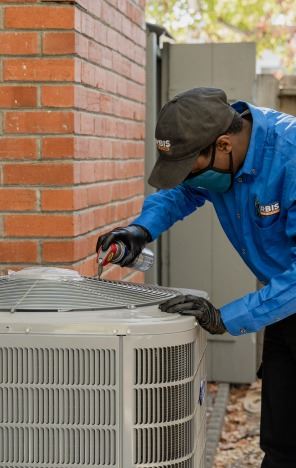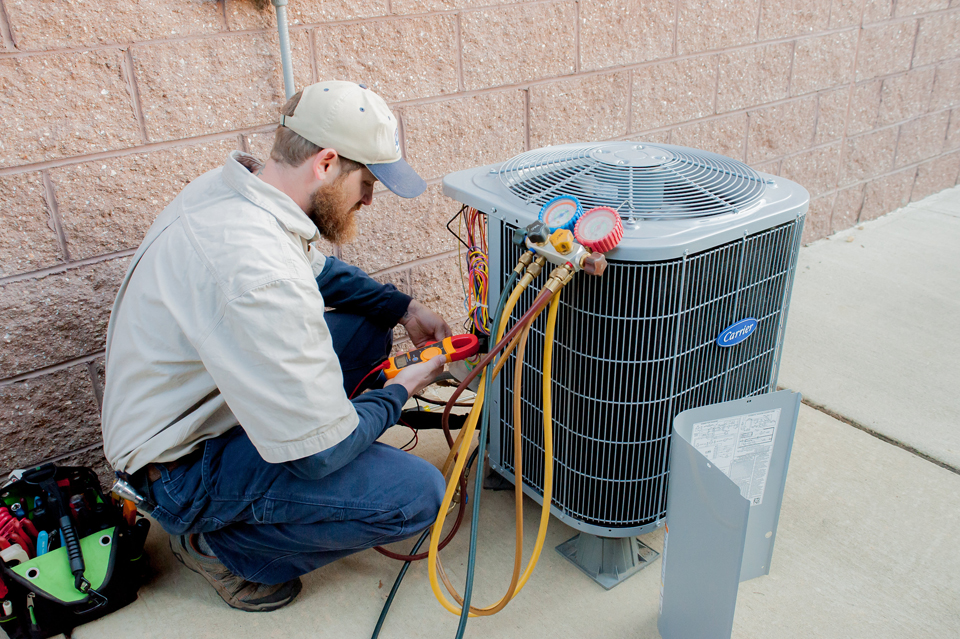Checking Out the Providers Provided for Setting Up a Heatpump and Furnace in Your HVAC Arrangement
When taking into consideration a new heating option, homeowners usually face the decision in between heatpump and heaters - heat pump service. Each system has distinctive benefits and drawbacks. Specialist setup plays an essential function in ensuring perfect performance and long life of the equipment. Comprehending the nuances of the setup process can affect the effectiveness of your a/c configuration. What specific solutions can improve the installation experience and warranty performance? The answers might stun you
Understanding Heat Pumps and Furnaces: Trick Differences
Warm pumps and furnaces serve the essential feature of regulating indoor temperature levels, yet they operate essentially various concepts. Heaters produce heat by burning fuel, such as gas or oil, or by using electrical energy to warm air. This heated air is then distributed throughout the home by means of ductwork. In contrast, heatpump move warm from one place to an additional, usually removing heat from the outside air or ground, also in cooler temperatures. This makes them an energy-efficient alternative for both heating and cooling.While furnaces are usually extra efficient in very cold climates, heatpump can supply year-round temperature control, adjusting to seasonal modifications. The installment needs likewise differ, as furnaces demand air flow systems for exhaust gases, whereas warm pumps require room for outside units. Understanding these distinctions is crucial for property owners evaluating their home heating and cooling options.
Advantages of Setting Up a Heat Pump
Picking to set up a heat pump supplies a number of benefits that can improve home comfort and power effectiveness. Heatpump supply both heating and cooling down solutions, making them functional for year-round climate control. Their capacity to transfer warm as opposed to create it results in reduced energy usage, which can result in considerable financial savings on utility bills.Additionally, warmth pumps run quietly contrasted to conventional heating unit, adding to a more calm home atmosphere. They additionally need much less upkeep, as they have fewer moving components and do not rely upon combustion processes.Moreover, heatpump are environmentally pleasant, as they make use of renewable energy sources, reducing greenhouse gas exhausts. Their installation may qualify home owners for energy effectiveness discounts or tax obligation incentives, even more enhancing the economic advantages. Overall, warm pumps stand for a reliable, eco-conscious choice for modern cooling and heating systems, ensuring comfort and sustainability.
Advantages of a High-Efficiency Heating system
A high-efficiency heating system uses substantial energy cost savings, which can cause minimized energy expenses for house owners. Furthermore, these systems contribute to a reduced ecological influence by making use of much less gas and launching less exhausts. Boosted convenience degrees are also an essential benefit, as these heating systems maintain more regular temperatures throughout the home.
Power Financial Savings Possible
While lots of house owners seek ways to reduce energy bills, buying a high-efficiency heater can substantially improve energy financial savings. These heating systems use advanced technology to transform a higher percentage of fuel right into useful heat, substantially enhancing energy efficiency. With a Yearly Fuel Utilization Performance (AFUE) rating frequently exceeding 90%, high-efficiency designs can save home owners considerable quantities on their heating prices compared to standard systems. Additionally, they run much more quietly and call for less frequent repairs, which can additionally add to overall savings. With time, the first investment in a high-efficiency heater normally settles through minimized energy expenditures, making it a monetarily smart option for those aiming to optimize their cooling and heating systems.
Environmental Influence Decrease
Buying a high-efficiency heater not just advantages house owners economically however likewise significantly decreases environmental impact. These furnaces run with raised power performance, which translates to reduce greenhouse gas emissions. By eating much less energy, they decrease dependence on nonrenewable fuel sources, adding to a decrease in air contamination and helping combat environment modification. Additionally, high-efficiency versions typically use advanced innovation that minimizes waste, more improving their ecological benefits. The shift to such systems lines up with international efforts to promote sustainability, encouraging a relocation towards renewable resource resources. Subsequently, house owners play an essential function in promoting a healthier earth while enjoying the advantages of minimized power prices and enhanced operational effectiveness. Such choices mirror a commitment to environmental stewardship and liable source management.
Boosted Convenience Levels
High-efficiency heating systems considerably boost convenience levels in residential spaces by keeping more constant temperature levels throughout the home. Unlike standard designs, these innovative systems make use of variable-speed blowers and modulating gas valves, enabling accurate temperature adjustments. This innovation lessens temperature variations, guaranteeing that each space continues to be evenly comfy. In addition, high-efficiency furnaces operate quietly, contributing to a tranquil interior atmosphere. They also enhance indoor air quality by making use of sophisticated purification systems that record dust and irritants, offering cleaner air for residents. Moreover, their energy-efficient procedure lowers energy costs, making them an economical option in the future. On the whole, high-efficiency heating systems not just promote a comfortable atmosphere however also enhance the overall living experience within the home.
Professional Installment Solutions: What to Anticipate
What can house owners expect during the professional setup of a heat pump and heater? An extensive evaluation of the home's heating needs will be performed by qualified specialists. This evaluation ensures the suitable sizing of the equipment, adding to energy efficiency and height performance.Once the assessment is full, the specialists will arrange an installment date, preparing the site for the brand-new system. Property owners can anticipate a precise installation procedure that consists of establishing up the heatpump and heater, attaching essential ductwork, and assuring appropriate electrical connections.Technicians will likewise check the cooling agent levels and check the system for leaks, guaranteeing whatever runs seamlessly. Home owners ought to expect clear communication throughout the procedure, with specialists describing each step and Learn More Here attending to any questions. After installation, a demonstration of the new system's operation will be given, making sure home owners recognize how to use their brand-new home heating solution successfully.
Regular Upkeep for Optimal Performance
After the expert installment of a heatpump and heater, regular maintenance becomes vital for making sure peak efficiency. This upkeep usually consists of normal inspections and servicing to recognize possible issues prior to they escalate. Service technicians typically inspect the filters, guaranteeing they are clean and replaced as essential, as unclean filters can impede airflow and efficiency.Additionally, inspecting refrigerant levels and Go Here ensuring electric links are safe and secure is important for operational safety and efficiency. Routine maintenance might additionally include cleaning the outside system of the heat pump to stop debris build-up, which can impact performance.Moreover, scheduling annual tune-ups helps to prolong the lifespan of the tools and keep energy efficiency. House owners are encouraged to keep documents of maintenance activities, as this paperwork can assist in recognizing patterns and click resources making sure prompt actions. Routine maintenance not just improves convenience but also maximizes power intake, causing set you back savings with time.
Fixing Typical HVAC Issues
Many home owners come across usual HVAC issues that can interrupt comfort and performance. One common issue is poor home heating or cooling, commonly brought on by filthy filters, obstructed air ducts, or malfunctioning thermostats. A simple check of the air filter can settle air movement troubles, while blocked vents ought to be cleared for peak performance.Another constant problem is uncommon noises, which might indicate loose components or mechanical wear. House owners must pay attention for squeaks or rattles and explore without delay to stop additional damage. In addition, constant cycling can signify that the system is extra-large or that a thermostat calibration is needed.Finally, refrigerant leaks in heat pumps can lead to lowered effectiveness and needs to be attended to by a professional. Troubleshooting these common concerns can assist in maintaining a comfortable interior environment while prolonging the life of the heating and cooling system. Seeking expert aid when required warranties that these issues are dealt with efficiently and securely.
Cost Factors To Consider for Heat Pump and Heating System Installment

Frequently Asked Questions
Just how Lengthy Does It Take to Mount a Heatpump or Heater?
The setup period for a heatpump or heater normally varies between four to 8 hours, depending upon the complexity of the system, existing framework, and the experience of the setup group involved in the process.
Exist Funding Options Available for Heating And Cooling Installations?
Financing options for cooling and heating setups differ by company, frequently including versatile repayment strategies, lendings, or credit score options. House owners can discover these options to take care of prices successfully, making certain comfort upgrades align with their budgetary constraints.
What Permits Are Required for Warm Pump and Heating System Setup?
The required licenses for warmth pump and heating system installation normally consist of structure, electric, and mechanical authorizations. Regional guidelines may dictate details needs, so speaking with the neighborhood authority guarantees conformity and facilitates a smoother installation procedure.
Can I Set Up a Heatpump or Heater Myself?
The concern of self-installation for a warmth pump or furnace arises often. Normally, it is advisable to get in touch with professionals to ensure safety and security, compliance with guidelines, and perfect efficiency, as inappropriate installment can lead to significant issues.

What Warranties Are Generally Used on Setups?
Service warranties on installations usually differ by specialist and equipment. Usually, they may consist of restricted lifetime guarantees on parts, one to five-year labor warranties, and specific insurance coverage for the system's performance and efficiency, reflecting sector standards. In comparison, warmth pumps move warm from one location to another, commonly extracting heat from the outdoors air or ground, even in cooler temperatures. Their ability to transfer warmth instead than produce it results in lower power usage, which can lead to substantial financial savings on utility bills.Additionally, heat pumps run silently compared to standard home heating systems, contributing to a much more tranquil home atmosphere. What can home owners anticipate throughout the professional installment of a heat pump and heater? Property owners can expect a thorough installation procedure that consists of establishing up the heat pump and heating system, attaching necessary ductwork, and ensuring correct electric connections.Technicians will certainly also check the cooling agent degrees and check the system for leaks, making sure every little thing operates perfectly. When thinking about A/c upgrades, particularly the setup of a warmth pump or heater, recognizing the associated costs is vital for house owners.